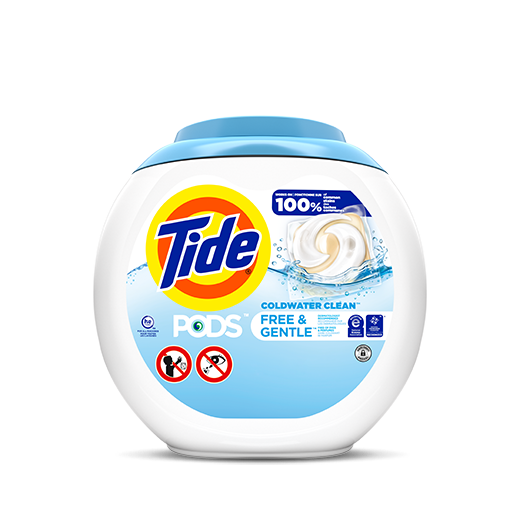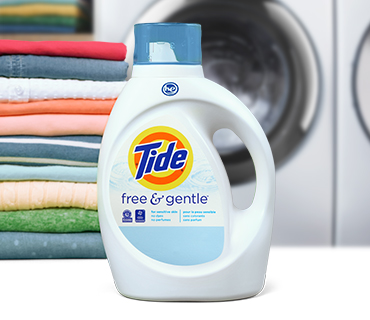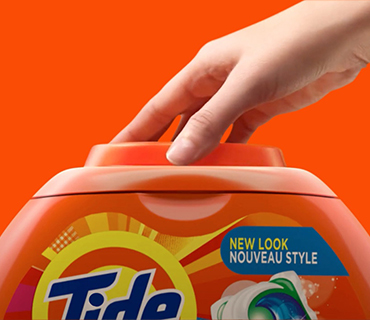All About Tide Ingredients
You have many reasonsto be interested in what ingredients are –and are not –in the products you use,so we’re committed to providing you with clear, accessible,and reliable ingredient information.
Even if chemistry isn’t your favorite subject, the below guide to Tide ingredients helps make it easy to understand how the parts of the Tide formula come together to deliver the Tide clean you expect and trust.
Looking for a specific ingredient? On this page, you’ll find information about our most commonly used ingredients. To get a more comprehensive look at all the Tide detergent ingredients, check out our A to Z ingredient list.
Or, head to the product listing page, where you can choose the specific Tide product you’re interested in, and simply click on the SmartLabel® button to learn more about the ingredients in that product. We believe ingredient information should be available to you wherever you are, so we were one of the first companies to participate in the online SmartLabel® system, and we are working to incorporate more of this information onto our packaging to further our transparency efforts and enable you to make the best decisions for you and your family.
If you’re looking for Tide products that are powered by plants, check out Tide Purclean, with over 75% plant-based ingredients. And, if you are shopping for sensitive skin, Tide Free & Gentle is our hypoallergenic formula and is the first and only detergent with both the National Eczema Association and National Psoriasis Foundation seals of approval.
Tide Detergent Ingredients
Stain and odor fighting power
The following trio of cleaning ingredients is the first line of defense for fighting tough stains and removing unwanted odors, leaving you with the Tide clean that you know and trust.
Surfactants: These are the core stain removers in Tide detergents. They remove anything greasy from fabrics, and they work well on stains and food residues. Surfactants break up stains and disperse dirt that otherwise wouldn’t dissolve in water.
Enzymes: Enzymes are naturally occurring proteins that break down stains into smaller pieces to make them easier to remove. Each enzyme works to break down and remove a specific type of stain, from grass to chocolate pudding to blood. Amazingly, these powerhouse ingredients are sensitive skin-friendly, and, because enzymes are naturally occurring and biodegradable, they are also sustainable.
Polymers: Different types of polymers perform different functions, such as keeping stains from re-depositing onto other garments after they’ve been removed by the surfactants.
Clothing care:
These are the ingredients that help protect the clothes you love.
Builders and chelants: Builders lock up calcium and magnesium to reduce water hardness, allowing surfactants to get on with their job of removing stains. Chelants bind to heavy metal ions in wash water like iron and copper, which may damage fabrics over time.
Scavengers: Scavengers seek out components like chlorine, which is commonly found in municipal tap water. Although the level of chlorine that comes from your tap may keep your drinking water safe, it can damage and fade fabrics over time.
Freshening
Perfumes and neutralizers keep clothes smelling fresh.
Perfumes: Perfumes give clothes a fresh, clean smell.
Neutralizers: These ingredients bind to and neutralize malodor molecules to help keep clothes smelling fresh.
Whitening and brightening
These are the parts of Tide detergents that keep your clothes at their brightest and whitest.
Hue dye: Bluing counteracts the yellowing that sometimes develops in white fabrics after repeated use and laundering. Hue dye produces a blue-white hue on fabrics, which makes them look whiter than yellow-white.
Optical brighteners: By absorbing UV light, optical brighteners help make your garments look whiter, brighter, and newer!
All Tide detergents meet ingredient standards of national and international regulating bodies, such as the United States Environmental Protection Agency and the European Union Commission.
Related products
Tide PODS® Free and Gentle Laundry Detergent







